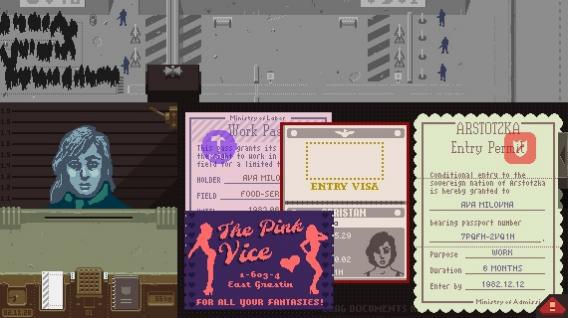When I sit down to play a new video game, I expect to have fun. I might expect to be immersed in a story or be engaged by clever game mechanics. I don’t usually expect to feel like a horrible person and generally bitter at the world. Yet, that’s what happened when I sat down to play Papers, Please.
The game is set in a Soviet-inspired country called Arstotzka, where you play a lowly border patrol operative, checking the papers of citizens and foreigners trying to get into the country. It sounds incredibly boring and tedious, and on the surface, it is. I like to give the characters over-the-top Russian accents in my head to alleviate that. But this oppressively low-tech game gets under your skin once you have to decide whether to separate a husband and wife, detain citizens who make honest mistakes to make a little cash to feed your kids, or risk your family’s safety by looking the other way to admit terrorists fighting the oppressive regime.
There isn’t really a “clean” way to get through the game. You are definitely going to feel major regret about a decision you made several in-game days before. Someone is going to suffer—you, the citizens, the government, or your family. These are the choices Papers, Please forces you to make. It’s a brilliantly executed morality dance that is another piece of proof of what video games are capable of, a gray and uncomfortable entry in the “games as art” debate.
Morality conundrums have been around in games for a long time, especially in the form of dialogue choices of varying purpose and intensity. But on some level, the morality of each choice was decided for you. Say something mean, and a character in the game will call you a jerk. Games like Papers, Please (or the high-profile The Last of Us) invite you to do things that will make you decide that for yourself.
This is a far more effective tool than the forced “choice” that Call of Duty imposed on players, to much public discussion. The game forced you to participate in a terrorist attack, and if you chose not to, the game simply would not continue. It was basically a movie on pause. That doesn’t realize the capacity that video games have to help us see our actions in a larger context, to safely toy with our own morality and explore our priorities. (In response to the controversy, the published version of the game included an option to skip the level altogether.)
It’s downright impressive that an ugly game with a boring premise has the ability to make me feel bad about myself. It has me wondering about the virtual reality future of games, where we might have the choice to stamp a paper, pull a trigger, or something even more jarring. Or maybe games will get to the point where certain material is just too traumatic to realize, especially after we’re wracked with shame from our sessions with virtual reality sex bots.
Update, Aug. 26, 2013: This post has been updated to clarify that, in response to the controversy, Call of Duty included an option to skip the terrorist attack level.
